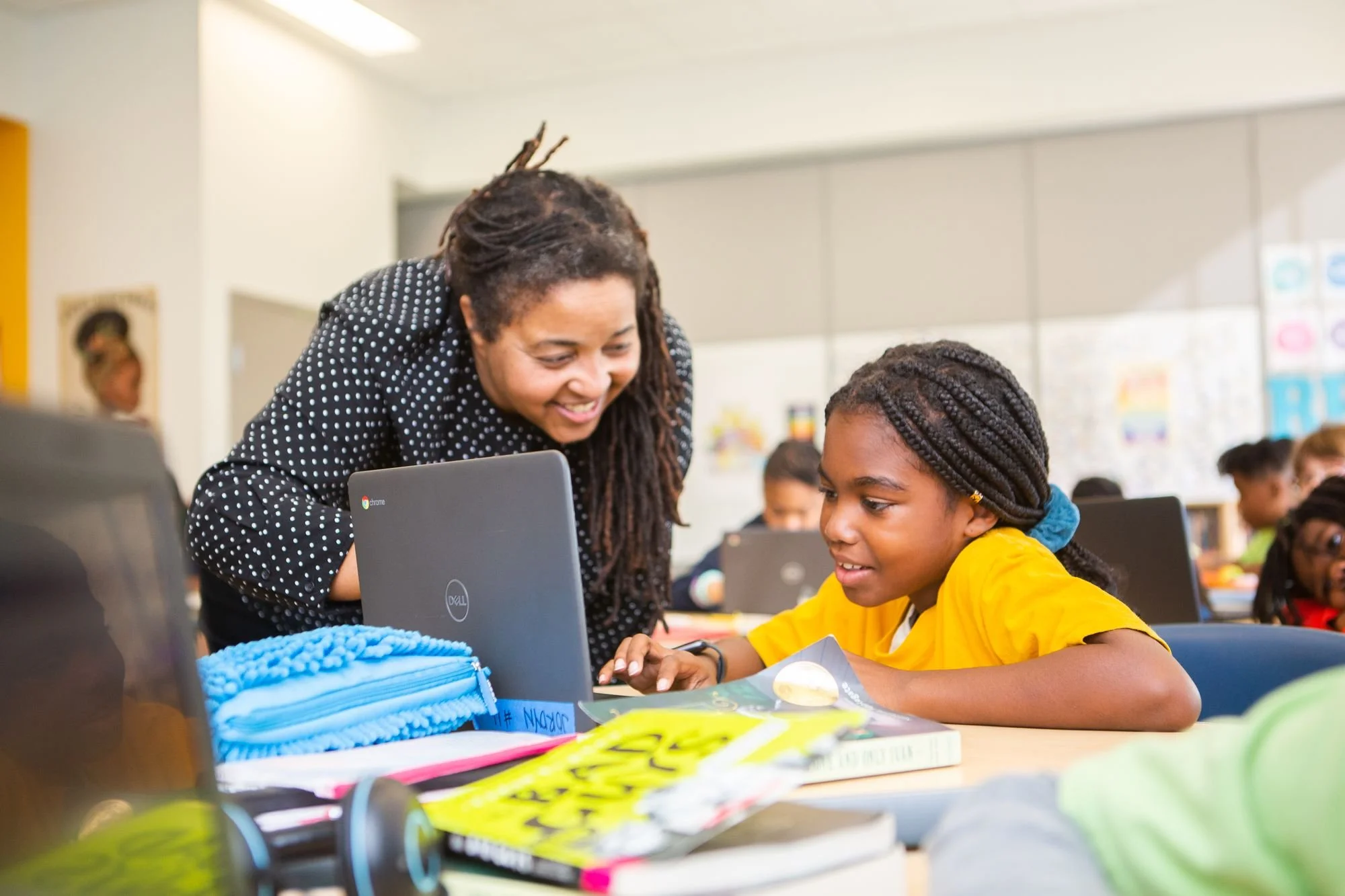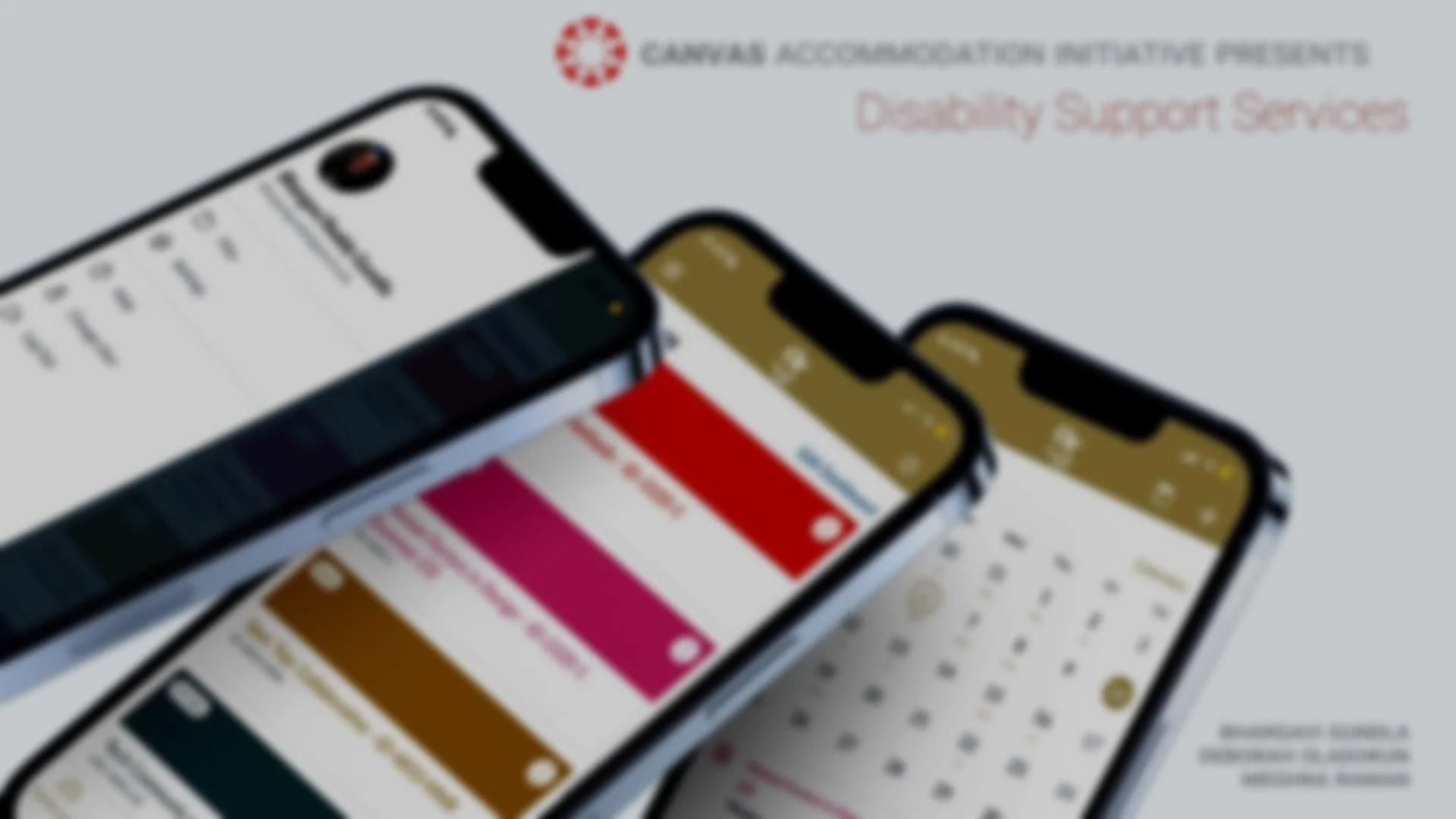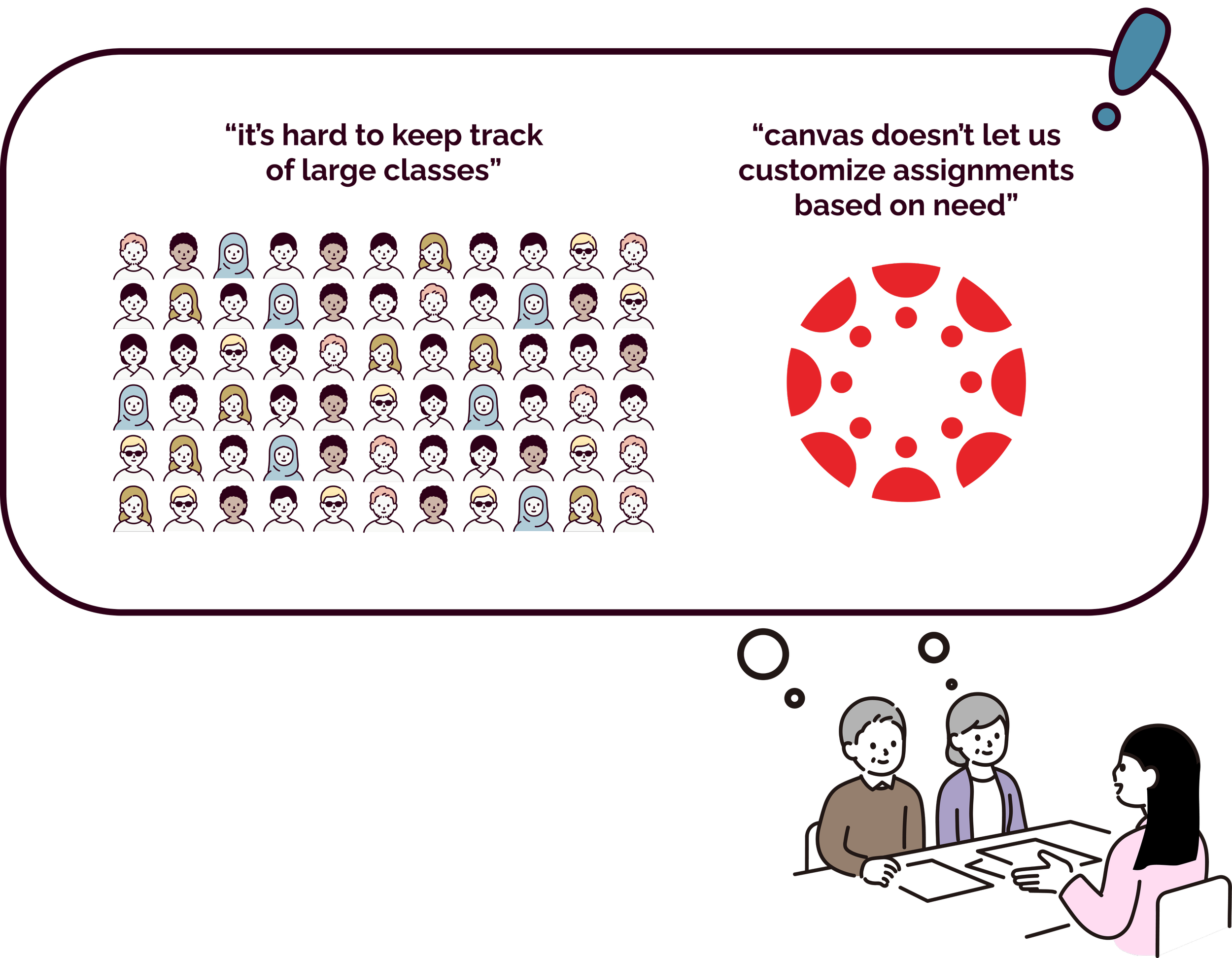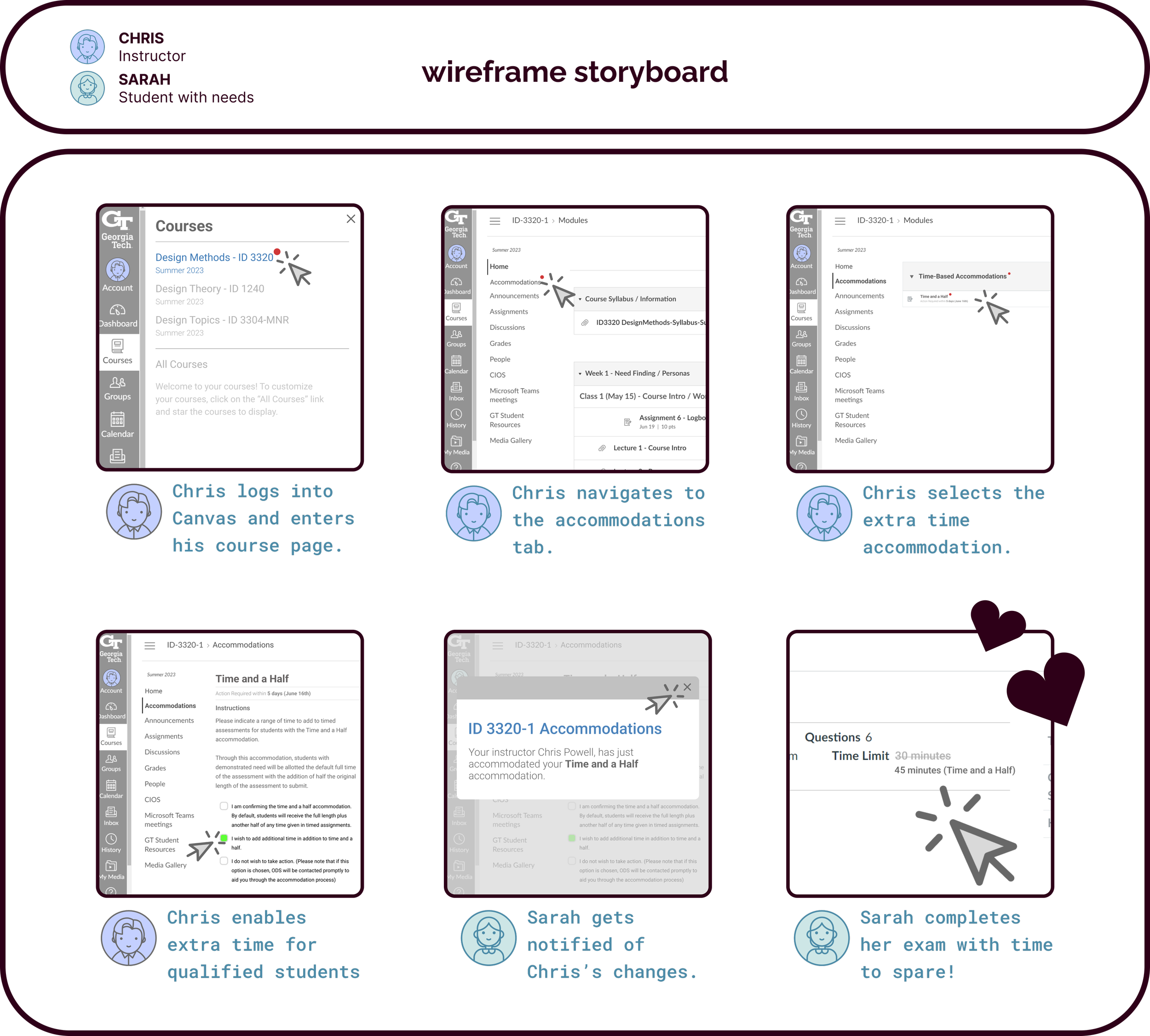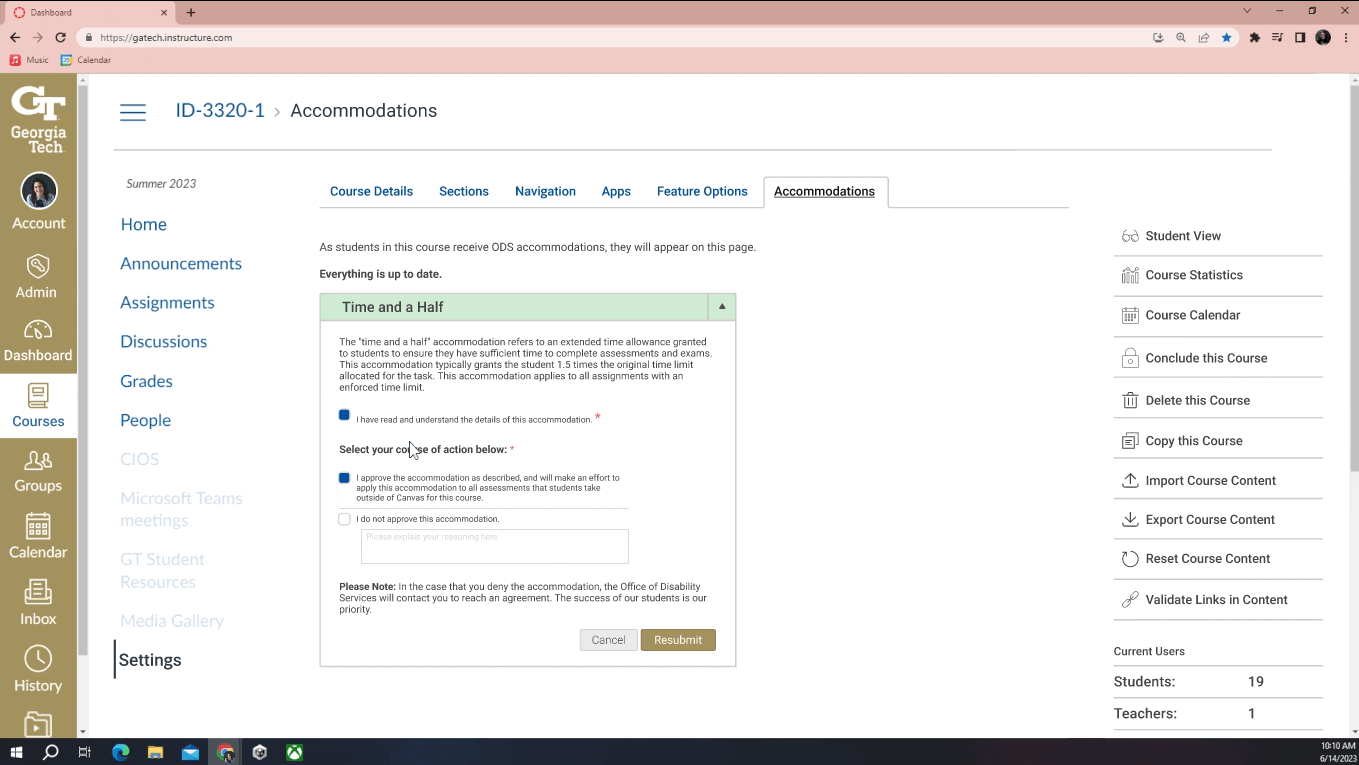
Canvas Accommodations Plugin
About Canvas
Canvas is a popular learning management service that facilitates an online learning environment for students and instructors.
integrating accommodations into course planning
My team developed a plugin that seamlessly integrates accommodations into instructors' course planning. Integrating accommodations into the educational system not only ensures equitable access for all students but also helps schools maintain compliance with legal and ethical standards.
integrated solution
Our team's solution seamlessly integrates into the existing architecture of Canvas. No need to download any additional apps!
inclusivity
Our solution supports and amplifies the Diversity, Equity, and Inclusion (DEI) Initiatives of both Canvas and the Georgia Institute of Technology.
compliance benefit
The Individuals with Disabilities Education Act (IDEA) and Section 504 of the Rehabilitation Act of 1973 require schools to provide reasonable accommodations to disabled students.
my role
user researcher
ui/ux Designer
collaborators
2 user researchers
2 ux design mentors
responsibilities
ui & ux design
primary & secondary research
user interviews
research plan and methods
defining service concept
presenting findings
deliverables
foundation documents
persona mapping
journey frameworks
final concept presentation
tools
Figma
Notion
final concept presentation
a study in shifting problems (and users)
This project spanned a semester, where we started with mobility-focused problem and transitioned to a focus on how student disabilities affect class performance. We designed a solution to support instructors in the accommodations process.
research & exploration
we began by studying the physical accessibility of campus
At the start of the semester, we studied the challenges of students with mobility impairments. We found participants for the first interview phase but, had trouble reaching them afterward due to unavailability over the summer.
pinpointing problems and expanding our user group
During our interviews with our users, we learned about specific obstacles that make it difficult for people to get from place to place.
When we presented these topics in class, the critique we received was to be careful moving forward, as these issues may not be feasible for our project. We decided to expand our research to include people with invisible disorders into our research.
addressing topic 1: mobility on campus
At the start of the semester, we studied the challenges of students with mobility impairments. Our team developed foundation documents and personas through interviews. We were able to contact people who fit three user groups: primary, secondary and served.
user groups
Unfortunately, these participants were unavailable after the interview due to prior commitments.
personas
conducting ethnographic studies
We researched multiple topics and mapped out the data and reports we gathered. We found that our mind-mapping and affinity diagramming centered around a few key topics.
paratransit services
class accommodations
healthcare services
campus navigation
pivoting to topic 2: classroom accommodation
While both of these opportunities are strong, there were more benefits to focusing on classroom accommodations. At the end of the day, student success at an institution is in part measured by their academic success. Providing them with classroom accommodations support is most in line with Georgia Tech’s mission as well.
We moved forward with this opportunity.
opportunity statement
How should Georgia Tech further comply with accommodations regulations and improve classroom accommodation support to support students with documented needs?
final research
conducting two rounds of our hybrid workshop
We created a space for students to brainstorm solutions. Our team wanted to know more about how instructors were informed of students’ needs, and how student experiences varied across campus.
the brainstorming activity
Our four participants successfully used the figjam template to brainstorm their ideas.
results and debrief: we need to flip our perspective
We found that students don’t find the process of gaining accommodations to be particularly strenuous or mentally taxing, as we had thought going in. Most of the frustrations voiced by our participants was that after they register their needs, they had to contact each of their professors, and some of their instructors weren’t honoring their documented needs. We realized that we might be thinking about this problem from the wrong user perspective.
instructors supported our proposal
we had an interview session with two instructors, one primary instructor, and one graduate TA, and asked them about their experience with the accommodations process.
solution design
we designed a simple accommodation approval process
Currently, there is no way for instructors to customize assignments for specific students. Through this plugin, when professors have a student with a need, they can approve the accommodation to automatically integrate into the student’s coursework.
user journeys
storyboard scenario: a student that needs extra time on assignments
In the scenario, Sarah, a student with a ‘time and a half’ accommodation, enrolls in Chris’ course.
Chris updates Sarah’s coursework accordingly, all within Canvas!
no need for Sarah to advocate her needs to Chris
these changes apply to all students with the same need
integrating a solution into Canvas’ existing infrastructure
Through our current solution, students do not have to take any action after getting approval for their needs. ODS, the Office of Disability Services, integrates directly with Canvas. Instructors only need to approve accommodations, which will automatically update due dates or testing details accordingly, depending on the circumstance.
final prototypes
flow 1: the professor’s default view
When there are no action items, the new ‘Accommodations’ tab will be empty. The UI otherwise remains the same!
flow 2: instructor approving automatic accommodations
Time and a Half accommodations are very simple: they give students 150% of the normally given time for assignments and assessments. Once the professor approves the change, the affected students will immediately see a change in their student view.
flow 3: instructor denying accommodation
When the instructor denies an accommodation, the Office of Disability Services is contacted to begin a conversation with the professor regarding how they will ensure the students are accommodated.
In this system, you can see a time limit above the accommodation. Once the allotted time has passed, ODS will be contacted. This measure ensures that instructors do not forget to approve, and are actively taking care of their students’ needs.
closing
what’s next for Canvas accommodations?
While my team’s solution is a start at improving the accommodations process for students and instructors, there is a long way to go to improve the digital accommodations process and inclusivity of teaching apps.
improve the accessibility of Canvas infrastructure
design more intuitive site navigation and a more eye-friendly notification system throughout the app
integrate these features for mobile support
implement more user flows to show how the plugin would handle different accommodations. A few examples:
location-based accommodations
transcriptions from uploaded lectures
synchronous test updates to alternate locations
takeaways
While our research was so full of depth, the final product was very simple in nature. Creating a feature that professors can use to customize coursework for students with needs is a simple solution but one that can go far to help students succeed in class.

